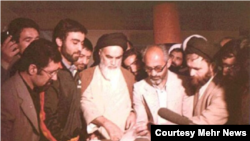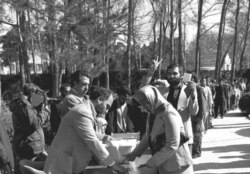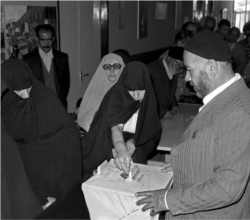As Iran marks the 42nd anniversary of a referendum that helped to solidify its 1979 Islamic Revolution, there is growing talk inside and outside the country of a need for another referendum to spur change, but little agreement about who should conduct such a vote and how.
Ayatollah Ruhollah Khomeini, Iran’s first Islamist supreme leader who seized power from Shah Mohammad Reza Pahlavi in February 1979, ordered a national referendum to be held weeks later try to secure public approval for the question of whether or not to turn the nation into an “Islamic republic.” After voting was held March 30-31, officials asserted that 98% of eligible voters said yes and proclaimed the date of the results, April 1, as an “Islamic Republic Day” holiday.
A second referendum held in December 1979 produced a similar declaration by Iran’s new Islamist rulers of a 99% yes vote in favor of their draft Islamic constitution, albeit with a lower claimed turnout than in the first vote.
In a VOA Persian special TV program broadcast Thursday to mark the anniversary of the March 1979 referendum, several Iranian diaspora activists and academics said there was substantial evidence that Khomeini and his supporters rigged the vote to ensure an overwhelming victory.
Many Iranians at the time did not realize they were voting in favor of what would become an authoritarian Islamist theocracy, said Mohsen Sazegara, a Washington-based former deputy minister in Iran’s first post-Islamic Revolution government. Nasim Behrouz, a North Carolina-based member of exiled opposition group Iran Revival or Farashgard, said the voting also was not done freely. Published images of the referendum showed that many voters were unable to cast a secret ballot as they placed green-colored “yes” votes into boxes under the watchful eyes of local officials.
Iranian researcher Bahman Jeldi of the Canadian Center for Persian Studies said there also were many reports of fraud, with people voting multiple times and stuffing ballots into the boxes. Hossein Lajevardi, a Paris-based former official at the Statistics Center of Iran, said the claimed 20 million yes votes in the March 1979 referendum exceeded the number of eligible voters by about 5 million.
Since 1979, Iran only has held one other referendum, a July 1989 vote on constitutional amendments aimed at enabling Ali Khamanei, a relatively low-ranking Shiite cleric at the time, to become Iran’s new supreme leader with expanded powers following Khomeini’s death the month before. Official results again asserted an overwhelming approval of the amendments.
Iranian President Hassan Rouhani marked the March 1979 referendum anniversary by telling a televised Wednesday Cabinet meeting that holding another referendum, as permitted in Article 59 of the constitution, is the best way for Iran to resolve its complex problems. Rouhani is due to leave office later this year after serving two four-year terms in which he fell short of fulfilling promised reforms while working within a complex power structure in which Khamenei has retained ultimate decision-making authority.
Khamenei has given no indication that he would agree to holding a referendum anytime soon.
Days before Rouhani’s referendum suggestion, 103 Iran-based dissidents published an open letter to United Nations Secretary-General Antonio Guterres and U.N. Security Council ambassadors, urging them to support their call for a different kind of referendum than the one proposed by Rouhani: a vote on whether to endorse a “peaceful transfer of power” from Iran’s “religious kleptocratic government and constitution” to a “secular democratic constitution.”
The signatories also said the Security Council should “sponsor and monitor” such a referendum.
Kourosh Zaim, a Tehran-based signatory of the letter and senior member of opposition group Iranian National Front, told the VOA Persian program that the proposed referendum would be a first step toward holding a U.N.-supervised national election for an interim assembly that would draft a new constitution based on the separation of religion and government.
Prominent Iranian diaspora figures interviewed for the TV program also weighed in on the content and conduct of a potential Iranian referendum.
Crown Prince Reza Pahlavi, son of the ousted shah, said a referendum should lead to a system of government that is democratic, separates itself from religion and guarantees the rights of minorities.
“My vote for such a system, regardless of whether it is a monarchy or a republic, will be a yes,” Pahlavi said.
Hassan Shariatmadari, a Hamburg, Germany-based Iranian dissident and son of senior Ayatollah Mohammad Kazem Shariatmadari who was a critic of Khomeini, said a referendum should give Iranians a choice between a revived constitutional monarchy or a secular parliamentary republic.
Habibollah Sarbazi, an exiled leader of the Balochistan National Solidarity Party representing the predominantly Sunni Baloch ethnic minority in southeastern Iran, said Iran’s future political system should explicitly protect the rights of its Baloch, Kurdish and other regional minorities.
George Haroonian, a Los Angeles-based Iranian American Jewish activist, said a future Iranian democracy should respect the rights of all minorities, including a dwindling number of Jews whom he said have long been treated as second-class citizens by the nation’s Islamist rulers.
“I firmly believe that in a free Iran, Iranian Jews will play a key role in rebuilding the country,” he said.
Turkey-based Iranian LGBTQ activist Rezvaneh Mohammadi also called for the rights of Iran’s LGBTQ community to be respected in any new political system.
Regarding the conduct of a potential referendum, Iran’s first post-revolution president, Abolhassan Bani-Sadr, who now lives in Paris, said the vote must have transparency and clarity in its questions. Cologne, Germany-based Mehdi Fatapour, who was the spokesperson of leftist group Organization of Iranian People’s Fedai Guerrillas in 1979, said the Iranian electorate also must be given ample time to consider the content of any referendum in order to make an informed decision.
Iranian American Sina Azodi, an analyst at the Washington-based Atlantic Council, cautioned that staging a referendum will not be enough to guarantee freedom and democracy for Iran.
“We should not repeat the mistakes of the 1979 revolutionaries and just think about overthrowing [the ruling system], as revolutions bring instability and danger,” he said.
Some commentators featured in the VOA Persian program also expressed skepticism that any referendum held under Khamenei’s rule would have legitimacy in the eyes of many Iranians.
“Considering the intimidation tactics [of the government], a free and fair referendum is almost impossible, unless opposition groups have enough power,” said Abdolali Bazargan, the California-based deputy leader of Iranian opposition party Freedom Movement of Iran and the son of Iran’s first post-revolution prime minister, Mehdi Bazargan.
Mashhad-based Iranian dissident Fatemeh Sepehri, one of 14 Iranian women who signed an August 2019 open letter calling on Khamenei to resign, indicated that a referendum held under his rule would trigger a boycott by at least some voters.
“Any vote cast will be a vote of support for this unjust [political] system, which has been against the rights of all women for the past 42 years,” said Sepehri, who was arrested in 2019 for signing the letter and released the following year. “As a woman, I will not be participating in any elections conducted by the Islamic republic.”
This article originated in VOA’s Persian Service.






